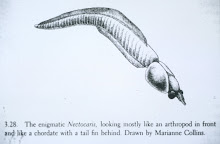I wanted to come to a place in which I could list and pause. A place I might choose upon learning my life was over. In which I could describe the world as an encompassing afterthought, with the meticulous urgency of a last living person given only so many decades. So that, consigned to the time before my ultimate eviction, I could reflect on the terminus of my term.
While my memories were still alive and secretly combustible, they awaited their birthright, your gaze. Said scrutiny was to be a gift from you, I decided. From you who came to exist eons later and found these notebooks -- first encased in cave ice, then smeared and waterlogged after the thaw -- from which you constructed evocative but inaccurate pictures. Ideas of an impossible past, the progeny of your tracemarks on damaged pages.
For years, I shared my life with someone who lived post mortem, who hated the present because it couldn't compare to her past. All day, she lay bound to her bed, submerged in blankets and clutching a stuffed chimera instead of my hand. Always in mourning, greeting morning and evening with have-done-with disillusionment. Silence answered my every sentence: Time wasted. Time already lost.
Staying with her meant keeping constant vigil: A loitering existence, vicarious and solitary. Expecting to collaborate with her on books of artwork and writing, I tried to coax her upward and ease her depression. Naive, I suppose. But perhaps redemption can only happen in moments of rare openness. At a seance amid bleak trees, the Luck God leans toward us. Will she open to me this once?
Instead of embracing that moment, she talked herself out of its reality. Now she lingers at some disfigured flourish in my mind. She persists in thought as surely as her features begin to blur -- as all features must after a decade's separation.
Hence this collaboration with you, my posited reader; this predictive half of the dialogue. Estranged as children, we had yet to meet until now. Displeased with aimlessness and solipsism, we wanted something else. Concordances, points of interest not founded in prejudice and habit.
Someone must share these sunsets with us, these glimpses into the character of the craggy man at the counter. These Pateresque delineations in the library: Insights into Flaubert's reproduction of his characters' thought. The neglected aether in Poe. Baudelairean symbolism that is resonant rather than reductive and so imbues his imagery with spiritual power. The zen behind the despair in Novalis; the lucubrations behind Leopardi's grief. The shared awakening of writer and reader, Baudelaire's famous twins.
All of these memories will be lost, like tears in rain. Sobering, to remember that even the best and most lasting books will burn eventually. Even they will be erased; even Catullus's name, as Keats said of his own, is writ in water (or flame). That's why it was crucial for Catullus and Keats to have shared their writings with readers. Every paradise is by nature lost. What resonant communication loses in permanence, it gains in plangency. If art is equal parts Platonic and Heraclitic, then the persistence of ideal things is not literal. It is a form of emphasis -- an indication of local resonances.
Hence this Victorian vessel, the public diary. Too classical in origin to be internet-specific, it is a private life conditionally revealed.
In choosing to share the music of her observations with chosen friends, Lady Worley Montague found secret ways exercise her neglected talents -- talents which demanded an audience. And though most of us aren't of Montague's caliber (and should have the humility to admit it), we are to our time as she became to hers. We are actively creating "our time," which doesn't always correspond to its accepted social meaning. We stand apart from it and yet inscribe it.
That's why you're encouraged to introduce yourself here, my semblance and sister or brother: This is our time, not theirs. Our decades, our centuries, to define and interpenetrate as we like. Whether or not our genius proves to be a lie, the presumption of it leads us to fecundity. Flatter yourself for me, dearest reader, as I will flatter myself for you.
Monday, June 7, 2010
Subscribe to:
Posts (Atom)
